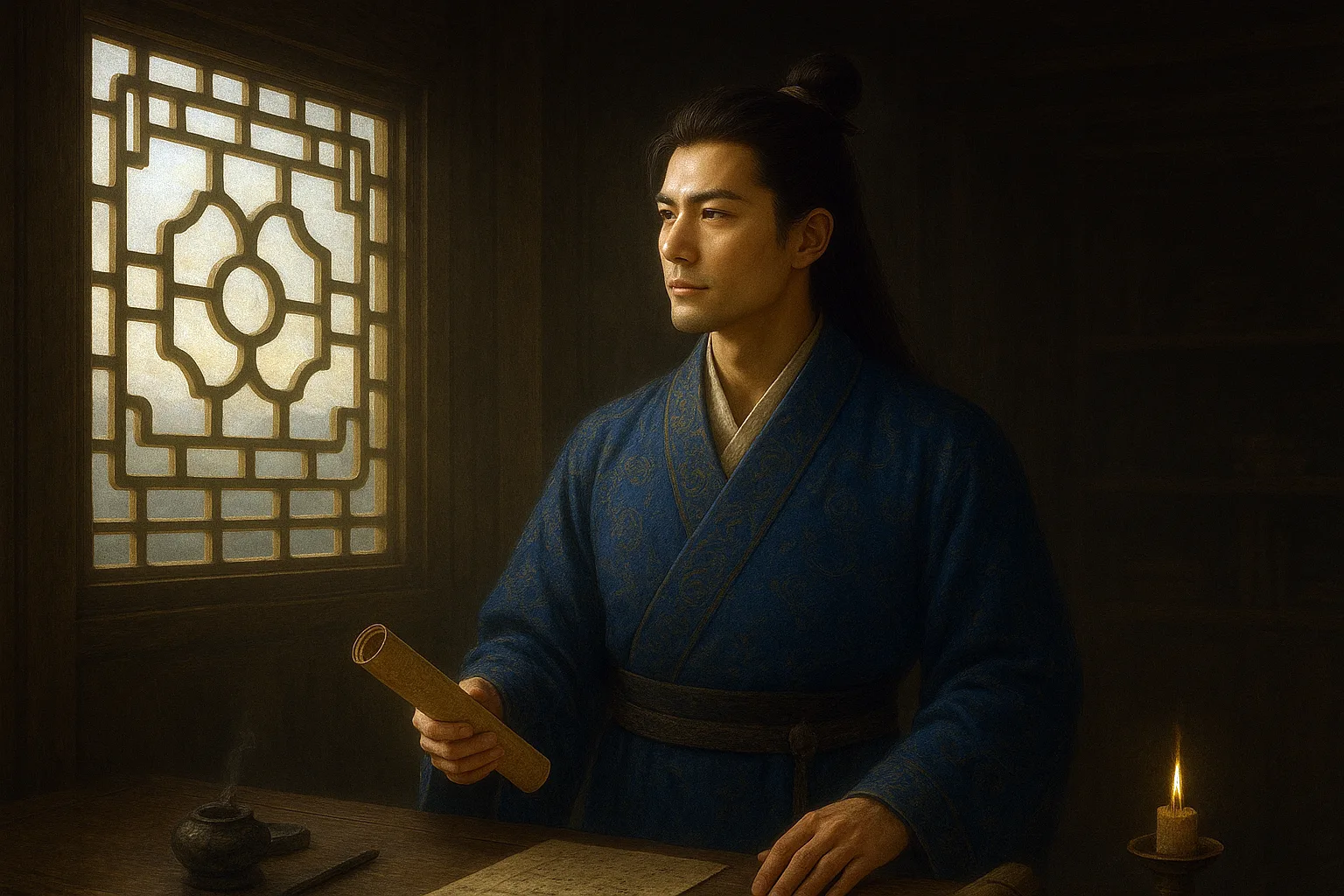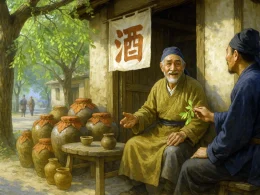Last night from South Pavilion what did I see?
It seemed that I saw Luo in a clear dream.
Who says that from my wife I parted would be?
My sons and daughters stood by my desk to read, as it would seem.
I suddenly felt it was true, then I knew
After hard thinking it was but a void view.
What is left of my heart inch by inch now?
Wiping tears, I sit in vernal breeze on the brow.
Original Poem
「驩州南亭夜望」
沈佺期
昨夜南亭望,分明梦洛中。
室家谁道别,儿女案尝同。
忽觉犹言是,沉思始悟空。
肝肠馀几寸,拭泪坐春风。
Interpretation
This poem was composed in the first year of Shenlong era (705) under Emperor Zhongzong of Tang, when Shen Quanqi was exiled to Huánzhou (present-day Nghệ An Province, Vietnam) due to his association with Zhang Yizhi. Gazing into the distance from the southern pavilion, the poet was stirred by the scenery, recalling scenes of family reunions in his central plains homeland, lamenting his ill-fated destiny and fallen circumstances. While in a foreign land, far from his native country, his heart was filled with solitude and longing. "Night Gaze from the Southern Pavilion in Huánzhou" is not merely a homesick poem but a psychological piece interweaving "dream and awakening," mirroring "illusion and reality." The poet reconstructs the warmth of his homeland through dreams, only to confront the irreparable reality upon waking, creating emotional fluctuations and spiritual resonance.
First Couplet: "昨夜南亭望,分明梦洛中。"
Zuóyè nán tíng wàng, fēnmíng mèng Luò zhōng.
Last night, gazing from the southern pavilion,
Clearly, I dreamed of being in Luoyang.
The opening couplet is straightforward, specifying time and place. The poet's "gazing from the southern pavilion" is a real action, while "dreamed of being in Luoyang" is a psychological projection. The juxtaposition of reality and illusion instantly captures the矛盾 of "body in a foreign land, heart in the homeland." The word "clearly" is powerful—though the dream is illusory, it feels vivid and tangible, revealing the depth of the poet's longing.
Second Couplet: "室家谁道别,儿女案尝同。"
Shìjiā shuí dào bié, érnǚ àn cháng tóng.
In the dream, no one spoke of parting;
My children shared the table with me as before.
This couplet entirely depicts the warmth of the dream. The poet transforms loneliness into illusion, creating a virtual scene of family reunion. The language is extremely plain yet deeply moving. "No one spoke of parting" is full of helplessness—though separated in reality, the dream denies this pain; "shared the table" carries a homely touch, where the fleeting warmth of daily family life becomes the most heartbreaking dream.
Third Couplet: "忽觉犹言是,沉思始悟空。"
Hū jué yóu yán shì, chénsī shǐ wù kōng.
Suddenly awakening, I thought the dream was real;
Deep in thought, I realized it was all emptiness.
This couplet is the poem's turning point and the moment of spiritual collapse. "Suddenly awakening" captures the abruptness of waking from the dream; "thought the dream was real" shows the intertwining of dream and reality—the poet still lingers in the dream's afterglow. "Realized it was all emptiness" highlights the despair upon awakening; "emptiness" refers not only to the dream's illusion but also to the emptiness of life and fate. With extremely concise language, Shen Quanqi reveals the psychological plight of exile, making this one of the most profound psychological depictions in early Tang poetry.
Fourth Couplet: "肝肠馀几寸,拭泪坐春风。"
Gāncháng yú jǐ cùn, shì lèi zuò chūnfēng.
How much of my heart and guts remain?
Wiping tears, I sit facing the spring breeze.
The concluding couplet uses contrast to convey deep emotion. The first half expresses extreme sorrow, the latter half seeming calm. Superficially, "Wiping tears, I sit facing the spring breeze" appears self-consoling, but the "spring breeze" here does not signify genuine joy—it is a wordless acceptance after loss. Tears are wiped, but sorrow remains; the breeze is warm, but the heart is cold. It transforms the poet's solitude into a serene, almost transcendent sorrow.
Holistic Appreciation
This poem is a exemplary work among Shen Quanqi's exile poems. The poet uses a dream structure as the core, interweaving illusion and reality, joy and sorrow, warmth and loneliness into a complete psychological curve. The first two couplets are tender and lingering, the middle two are stark and desperate, and the final couplet concludes calmly, forming a spiral rhythm of sorrow that moves "from dream to reality, from emotion to enlightenment."
Shen Quanqi's technique is highly polished, with strict tonal patterns, yet genuine emotion flows fluidly within the regulated form. The alternation between the illusion of the dream and the harshness of reality intensifies the poet's inner anguish. Particularly, the couplet "Suddenly awakening, I thought the dream was real; / Deep in thought, I realized it was all emptiness" vividly captures the dazed state of waking and the moment of realization—a rare "psychological moment depiction" in classical poetry.
Though the poem superficially expresses "homesickness," it more deeply reveals the powerless resistance of the lonely against reality: the brief reunion in a dream is the exile's only spiritual comfort; after waking, with tears dried, one can only "sit facing the spring breeze" for solace. When sorrow reaches its extreme, it turns into calm contemplation, presenting an artistic realm of "expressing sorrow through stillness."
Artistic Merits
- Interplay of Illusion and Reality, Overlapping Time and Space: The mirroring of dream and reality creates a multi-layered narrative structure.
- Strict Form, Sincere Emotion: Typical of the "Shen-Song style"—precise in structure yet profound in feeling.
- Exquisite Psychological Depiction: The恍惚 and epiphany at the moment of waking are rich in psychological realism.
- Movement in Stillness, Sorrow in Plainness: Instead of using loud lamentations, it expresses deep pain with a tranquil tone.
- Subtle and Resonant Conclusion: The juxtaposition of "spring breeze" and "tear stains" achieves aesthetic sublimation through the contrast of cold and warmth.
Insights
This is an exemplary exile poem that uses dreams to convey emotion and emotion to grasp truth. It teaches us that the deepest loneliness in adversity is often not physical displacement but spiritual wandering. Shen Quanqi uses dreams as a bridge, connecting homeland and foreign land, as well as hope and despair. After waking, he does not drown in sorrow but faces reality with the calm posture of "Wiping tears, I sit facing the spring breeze," showing introspection and resilience after trials. The poet uses the gentlest language to express the deepest sorrow—a soul's stance that, though shattered by fate, refuses to despair. As the poem conveys: Dreams may shatter, but the heart endures; tears may dry, but emotion lingers.
About the Poet

Shen Quanqi (沈佺期 c. 656–715), courtesy name Yunqing, was a native of Neihuang in Henan Province and an important poet of the early Tang Dynasty. Along with Song Zhiwen, he was renowned as one of the "Shen-Song" duo, whose work played a decisive role in finalizing the form of the five-character regulated verse (wuyan lüshi) in Tang poetry. His poems often include courtly compositions and travel-themed reflections, characterized by refined elegance and structural rigor. Shen was particularly skilled in the seven-character regulated verse (qilü), and his writing marks a transition from the lingering style of the Six Dynasties to the flourishing era of High Tang poetry. His contributions hold milestone significance in the development of modern-style verse (jintishi).












